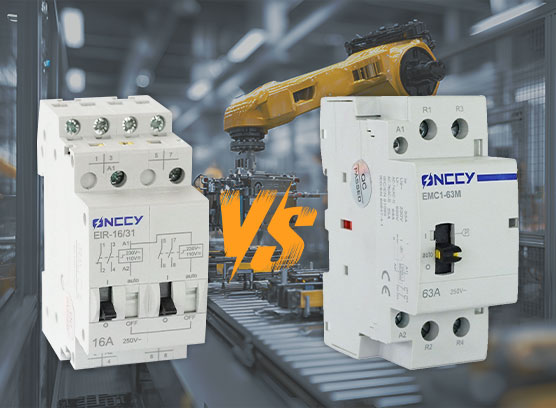Introduction
When it comes to smart and efficient electrical switching, two technologies often come up in the conversation: impulse relays and modular contactors. While both devices are used to control electrical circuits, their internal mechanisms, energy consumption, and use cases are very different.
If you’re planning a lighting automation project or designing a distribution system for an industrial facility, knowing when to use an impulse relay vs a modular contactor can make all the difference in efficiency, reliability, and cost.

What Is an Impulse Relay?
An impulse relay, sometimes called a step relay or latching relay, is an electromagnetic switch that toggles its output state (ON or OFF) with each brief control signal or "impulse." After receiving a pulse, the relay retains its position without needing continuous power.
Key Features of Impulse Relays
Latching behavior: Maintains ON/OFF state after each pulse.
No continuous power required to keep the load ON.
Energy-saving: Ideal for reducing power consumption.
Simple control: Used in multi-way switching setups.
Modular size: Fits DIN rail installations in panels.
Common Use Case: Stairwell lighting where multiple switches control the same lamp.
What Is a Modular Contactor?
A modular contactor is a type of contactor designed for residential, commercial, or industrial switching of high-power loads. Unlike impulse relays, modular contactors require continuous power to remain closed—the circuit stays connected only while the coil is energized.
Key Features of Modular Contactors
Normally open operation: Closes only when coil is energized.
Suitable for high loads: Handles lighting, HVAC, motors, and industrial equipment.
Arc suppression chamber: Provides safety during load switching.
Modular design: Easy to install and maintain on DIN rails.
Low-noise versions available: Ideal for residential environments.
Common Use Case: Switching large lighting circuits, industrial motors, or air conditioning systems.
Impulse Relay vs Modular Contactor: A Detailed Comparison
| Aspect | Impulse Relay | Modular Contactor |
|---|---|---|
| Working Principle | Toggles ON/OFF state with each pulse; maintains position without power. | Requires constant coil voltage to stay ON; opens when power is removed. |
| Control Type | Pulse-triggered (latching). | Coil-energized (non-latching). |
| Power Consumption | Extremely low; consumes power only during pulse. | Higher; needs continuous coil power. |
| Application | Multi-point lighting control, small loads. | Industrial switching, large load circuits. |
| Structure | Compact, simple, low-maintenance. | Robust, includes arc suppression, designed for frequent switching. |
| Installation | DIN rail-mounted, ideal for residential panels. | Also DIN-rail, but generally larger and heavier-duty. |
Which One Should You Choose?
Use an Impulse Relay if:
You want to control lighting from multiple locations.
You're looking for maximum energy efficiency.
The load is relatively small (like LED lights).
You need the relay to stay in position without holding current.
Use a Modular Contactor if:
You're switching high-current devices such as HVAC, pumps, or machines.
The system requires frequent and reliable switching.
You need a component that integrates with control automation systems (PLCs, timers).
The installation is part of a commercial or industrial facility.
Energy Efficiency and Noise Considerations
Modern impulse relays are virtually silent and extremely energy efficient, making them perfect for residential automation. Modular contactors, on the other hand, have evolved to include low-noise coil technologies and energy-saving features, particularly in smart buildings and green-certified infrastructures.
Conclusion
Both impulse relays and modular contactors play essential roles in today’s smart and industrial electrical systems. Choosing between the two depends on:
The type of load you're switching,
Your control requirements (pulse vs continuous),
Energy efficiency goals, and
Whether you're dealing with residential or industrial environments.
Impulse relays are ideal for low-power lighting applications with minimal energy consumption. Modular contactors are built to handle the heavy lifting in industrial setups where reliability and safety are paramount.
🔍 Need Help Choosing the Right Switching Device?
At ONCCY, we offer a wide range of high-performance impulse relays and modular contactors built for residential, commercial, and industrial use. Whether you're automating a smart home or engineering a complex power control system, we have the solution you need.
